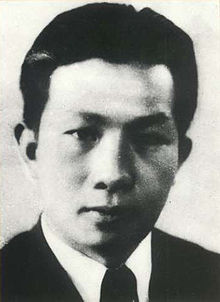Nie Er
| Nie Er | |
|---|---|

Nie Er
|
|
| Born |
Nie Shouxin (聂守信) February 14, 1912 Kunming, Yunnan, China |
| Died | July 17, 1935 (aged 23) Fujisawa, Kanagawa, Japan |
| Nationality | Chinese |
| Education | College |
| Occupation | composer, musician |
| Relatives | [聂鸿仪/Nie Hongyi] (father), [彭寂宽/Peng Jikuan] (mother), [聂叙伦/Nie Xulun] (Brother) |
| Nie Er | |||||||||
| Traditional Chinese | 聶耳 | ||||||||
|---|---|---|---|---|---|---|---|---|---|
| Simplified Chinese | 聂耳 | ||||||||
|
|||||||||
| Nie Shouxin | |||||||||
| Traditional Chinese | 聶守信 | ||||||||
| Simplified Chinese | 聂守信 | ||||||||
|
|||||||||
| Transcriptions | |
|---|---|
| Standard Mandarin | |
| Hanyu Pinyin | Niè Ěr |
| Wade–Giles | Nieh Erh |
| Transcriptions | |
|---|---|
| Standard Mandarin | |
| Hanyu Pinyin | Niè Shǒuxìn |
| Wade–Giles | Nieh Shou-hsin |
Nie Er (14 February 1912 – 17 July 1935), born Nie Shouxin, courtesy name Ziyi (子義 or 子藝), was a Chinese composer best known for March of the Volunteers, the national anthem of the People's Republic of China. In numerous Shanghai magazines, he went by the English name George Njal.
Nie Er's ancestors were from Yuxi, Yunnan, in southwest China. He was born in Kunming, Yunnan. From an early age Nie Er displayed an interest in music. From 1918 he studied at the Kunming Normal School's Affiliated Primary School. In his spare time, he learnt to play traditional instruments such as the dizi, erhu, sanxian, and yueqin, and became the conductor of the school's Children's Orchestra. In 1922 he entered the Private Qiushi Primary School (Senior Section), and in 1925 entered Yunnan Provincial Number One Combined Middle School.
In 1927 Nie Er graduated from Yunnan Provincial Number One Combined Middle School, and entered Yunnan Provincial Number One Normal School. At school, he participated in the Book Club, and organised the "Nine-Nine Music Society", which performed within the school and outside. During this time, he learnt to play the violin and the piano.
In June 1931, Nie Er entered the "Mingyue Musical Drama Society" as a violinist. In July 1932 he published A Short Treatise on Chinese Song and Dance, in which he criticised the Drama Society's president, Li Jinhui, as a result of which he was forced to leave the society. Prior to joining the Lianhua Film Studio on November 1932, he took part in shaping the Bright Moonlight Song and Dance Troupe. He later joined the musical group of the "Friends of the Soviet Union Society". He also organized the "Chinese Contemporary Music Research Group", which participated in the Leftist Dramatist's Union. In 1933, Nie Er joined the Communist Party of China.
...
Wikipedia
